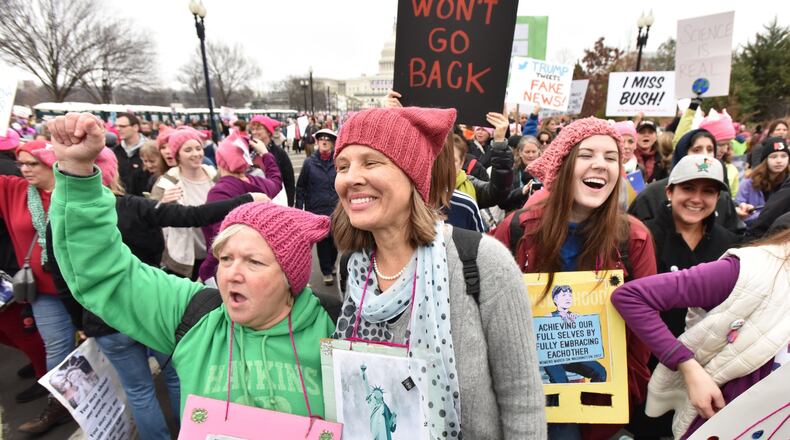Donald Trump supporters derided them as snowflakes, but American women turned themselves into an avalanche of activism this weekend in Washington, D.C.
An estimated 6,000 to 10,000 Georgians participated in the massive Women’s March on Washington on Saturday, most traveling 26 hours in cramped charter buses that drove through the night, deposited them at the march and headed back 11 hours later. One of those buses left downtown Decatur at 8:30 Friday night and pulled into the RFK stadium parking lot Saturday at 9:30 a.m., part of a fleet of 1,200 other charter vehicles from as far away as Alaska and California.
“It was grueling but worth it,” said photographer Kay Hinton of Decatur, as she finally had a moment late Saturday to shed her “Hear Our Voices” sign in a restaurant lobby and sit down. Hinton traveled with her wife, Lynn Adams, and one of their daughters Katie and a satchel of healthy snacks and bottles of water they happily shared on the bus. “It was important for our voices to be heard. The fact we have daughters made us want to go so they know they have a platform.”
Brandishing signs announcing, “You Can’t Comb Over Racism,” “Nasty Grandmas Donald Trump Warned You About,” and “Fight Like A Girl,” 53 marchers, including a contingent of 11 from Columbus, stepped out of the bus into the drizzly gray morning and joined a fast-moving queue of pink-hatted women and men striding to the march. Half the marchers on the Decatur bus sported a version of the pointy-eared pink cap, a reference to Trump’s vulgar 2005 exchange with TV personality Bill Bush that surfaced during the campaign.
“My grandmom made me mine,” said high school sophomore Emilia Couture.
As in many cities holding sister events including Atlanta, Chicago and Los Angeles, participation in the Washington March far exceeded projections. Some 200,000 were expected. Many more arrived. Citing an exact attendance is difficult, but the Washington Metropolitan Area Transit Authority report of 1,001,613 entries onto trains Saturday suggests at least a half million people attended. That ridership represents the second highest in the 40-year history of the transit system, slightly behind Barack Obama’s first inauguration day in 2009.
The impenetrable crowds reduced the march to a crawl, and the glittering roster of celebrity speakers and the main stage were tiny dots in the distance for most marchers who couldn’t thread their way any closer. (Familiar exchange: “Where does the march start?” “No idea.”)
Waiting was the order of the day. More than 125 marchers lined up at a set of port-a-potties. Veterans of mass marches brought their own toilet paper, dispensing it to the less prepared. A coffee shop suggested by Capitol police as out of the mainstream still had 47 marchers in line for lattes. Hot dog stands sold out of pretzels before noon.
Still, marchers remained cheerful, even as they struggled to keep track of one another and catch a glimpse of speakers. “We had a chain of nine people, four moms and five daughters,” said Carolyn Munson of Decatur. “We never let go. People were very respectful and allowed us to hang on and stay together. We could see a bit from far away, but the screen was clear. I was screaming with joy when the Indigo Girls were in the house. Janelle Monae brought tears to our eyes when talking about Black Lives Matter with the mothers of victims right beside her.”
“I stood among 700,000 strangers shoulder to shoulder, sandwiched in like sardines, celebrating our diversity and united as one in spirit,” said DeKalb teacher Holly Lanford, who considered the march a wake-up call to return to Georgia and fight for change. Her first action: Urging Congress to vote “no” to Michigan billionaire Betsy Devos’ nomination to lead the Education Department. A banner stating “Betsy DeVos is no Betsy Ross” drew frequent applause.
No arrests were reported, and both marchers and security praised one another. “A female National Guard member shook our hands, thanked us for coming to D.C. to march and told us how proud she was to be participating in the event in her way,” said Janet Tomko of Buckhead. “She was from West Virginia and has a brother who is gay and recently adopted a child with his husband. She asked us to march for her and for her brother and his family. We were proud to continue our march on her behalf,” said Tomko, who attended with her two teenage daughters and three other mother-daughter combos via Skedaddle Bus #2 out of Atlanta.
Cary Walker of Atlanta planned to go to Washington with her children to watch the inauguration of the first woman president. “Instead, I was compelled to go to march for their future. To me this was not about losing a race but losing our sense of who we are as a country and a community,” she said. “I saw people carrying signs and chanting their support for all kinds of people: women, people of color, immigrants, Muslims, the poor, the sick even if that didn’t necessarily reflect their own identity. I felt an amazing sense of community with people I didn’t know but who seemed to share many common values.”
Lyndsay Arrendale, state administrator for the Georgia chapter of the march, expressed delighted with the Peach State’s performance. “Our showing is proof that despite what Trump thinks about our Georgian cities ‘falling apart,’ we stood together in complete solidarity and strength as we peaceably assembled in Washington.”
One of the first Atlantans to sign up for a Washington-bound bus, Debra Aring of East Point said, “As I marched yesterday, there was little doubt in my mind that this event would turn into a movement. I know I’m not alone and I join with countless other women who are ready to do the work at hand. We have an obligation to speak truth to crazy. That started Saturday and it won’t stop.”
About the Author
Keep Reading
The Latest
Featured




